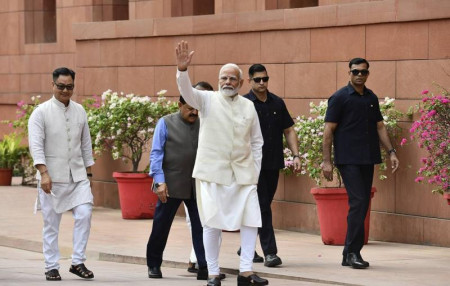
- Press review: US lets Kiev use anti-personnel mines and Iran may halt uranium enrichment
- Press review: Uranium costs soar as Moscow updates nuclear doctrine and US OKs attacks
- Press review: Russian air defenses can down Western missiles as EU conducts live exercise
- G20 leaders adopt Rio de Janeiro Summit Declaration
Indian Prime Minister Narendra Modi will pay a one-day visit to Moscow on July 8, that country’s Tribune newspaper reported, citing sources. TASS clarifies the date as July 8 to 9. Meanwhile, the Russian Primakov Readings forum saw Presidential aide Yuri Ushakov confirm to journalists, though without specific time limits, that Modi’s trip to our country has been in active preparation as of today.
Nevertheless, the upcoming visit to Moscow will be the Indian PM’s first foreign trip following his reelection for a third term as head of the Indian government — a demonstration of foreign policy priorities amid that country’s multi-vector approach. Last time, Modi visited Russia in 2019, when he arrived in Vladivostok, and before that it was in 2015. And his latest meeting with the Russian President was at the September 2022 SCO summit in Uzbekistan. Since then, the leaders of the two countries have communicated by phone alone. "The proposed visit to Moscow will let India show that its policy of strategic autonomy is going to carry on," the Hindustan Times writes with a broad hint to the Americans.
For Russia, this looks like following up upon the Russian president’s active policy along the Asian track after Putin's trips to North Korea and Vietnam.
The specific agenda of negotiations between Vladimir Putin and Narendra Modi is yet to be revealed, but the key thing has been clear. Narendra Modi is "eyeing stronger ties" with Moscow, the Tribune writes, headlining this thought to drive the point home. And this "is expected to underline the engagement between India and Russia, the historical partners who are also seeking new partnerships in the fast-changing world order," the newspaper goes on to say.
In Tribune’s view, the visit’s "significance" is its "standalone" nature, not being clubbed with the BRICS summit set to be held in Kazan in October this year. And besides, "it comes soon after he took charge of the government for the third term and after Russian President Vladimir Putin was re-elected for the fifth time in March."
In fact, India has been looking for a normal relationship with everyone else, hunting up benefits where they seem obvious. Is there anyone to condemn New Delhi for that? A while back, it might seem that India was relying on the United States in its age-old multi-vector and multifaceted dispute with China. In September 2023, the G20 summit in New Delhi witnessed US President Joe Biden announce a joint project for a major India—Middle East—Europe economic corridor designed to supply energy and goods. This was deemed as a US attempt to bind India to itself by means of backing it against China, since this American transport project seemed a counterpart for China’s similar Belt and Road Initiative.
With China having invested billions in its project (some reports even refer to a trillion dollars), the United States has been only fostering its relevant idea that requires landmark investment with no quick returns. Today we hardly hear that the American project is somehow making headway to keep up with the Chinese one. Amid political turbulence in the United States, the projects that country presented at the G20 summit in New Delhi appear a mere PR campaign.
The United States is doing things for itself alone, not for India or anyone else. Self-interest has been the key feature of its policy. And India has been promoting its own interests.
Since the war in Ukraine began, followed by Western sanctions against Russian energy, India has ramped up purchases of discounted oil despite initial pressure from the United States, saying that a step to that effect was needed to control domestic oil prices, Indian media write.
"No matter that the US-led sanctions on Russian oil trade have been tightened, Russia has replaced Saudi Arabia as the largest source of imported crude in the world," the Tribune points out.
According to Kepler, a company dealing with commodity intelligence and analytics, oil sales to India are growing month after month. In March this year, the amount of delivery increased by six percent as compared to February —
up to 1.7 million barrels per day (bpd). Most interestingly, both sides have been benefiting from anti-Russian sanctions, strange as it may seem. "Ironically, India processes a significant amount of this Russian crude and resells it to Europe at a profit — ironical because European refineries are banned from directly buying Russian oil since the Ukraine [conflict]," the Tribune states with pleasure.
Also, Russia has not halted weaponry exports to India. The latter has no plans to waive cooperation in this area, both because Russian arms are way cheaper than their Western counterparts, and because the Indian armed forces have been using them for decades and undergoing all the required relevant training.
Two years into Moscow’s special military operation in Ukraine, India has been walking a "fine line in its ties with Russia", as the Indians put it themselves. Ignoring the fear of irritating the hegemon, New Delhi keeps developing relations with Moscow while refusing to criticize its performance in Ukraine. And the so-called "global summit" recently held in Switzerland featured India’s refusal to sign a joint communique, along with China and other countries of the Global South, devaluing the American idea to rally up the rest of the world against Moscow.
And this balanced New Delhi’s policy cannot but inspire respect with Russia.









